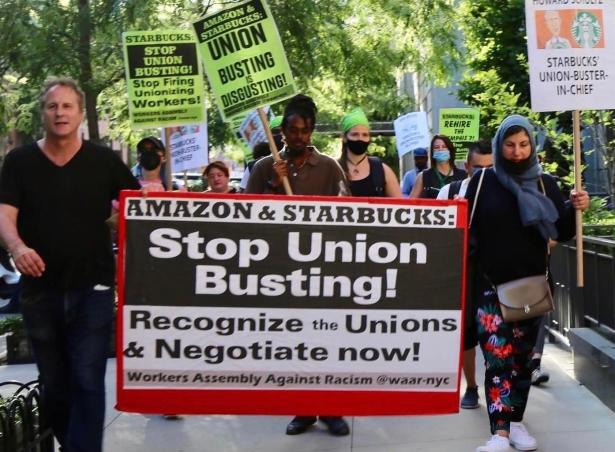Companies spend hundreds of millions of dollars each year hiring professional union-busters to campaign against and defeat union organizing drives. However, only a fraction of this spending is publicly reported because of loopholes and other weaknesses in the law and its enforcement.
A new report by the Inspector General at the U.S. Department of Labor (DOL) found that the Office of Labor Management Standards (OLMS)—which oversees and enforces the union-buster (persuader) reporting requirements—“did not effectively enforce persuader activity requirements to protect workers’ rights to unionize.” While the report rightfully explains that more work must be done, there are many reasons the current OLMS should be commended for taking meaningful steps toward meeting its responsibility, and the report should be viewed as a roadmap for the agency moving forward.
OLMS is a tiny agency of fewer than 200 employees charged with enforcing the many provisions of the Labor Management Reporting and Disclosure Act (LMRDA), which include persuader reporting, union financial reporting, ensuring fair union elections, certifying compliance with labor standards as a condition of federal transit funding, and more. However, since its inception, OLMS has overwhelmingly prioritized enforcing the LMRDA’s union compliance provisions while failing to apply the same level of scrutiny required under the law to employers and union-busters. The Inspector General (IG) report makes clear that OLMS must begin allocating its resources more equitably to fulfill its obligation to protect the right of workers to engage in collective bargaining, mutual aid, and union representation.
The IG report points out that a large percentage of persuader reports filed by employers and union-busters are filed delinquent and/or deficient, and the IG recommends that OLMS improve its systems for tracking and obtaining timely, complete reports. These recommendations are spot-on and should be fairly simple to institute. It’s important to note that OLMS in the past two years has received more than double the number of consultant reports compared with prior years due to an increased focus on compliance efforts (314 in 2021, 747 in 2022). And in perhaps an unprecedented action, OLMS has sued two corporations—Starbucks and Amazon—to enforce subpoenas seeking information to determine whether the companies failed to file required reports. OLMS leadership is clearly attempting to fulfill its obligations under the law.
The report also faults OLMS for not adequately publicizing its persuader “tip line” or having adequate procedures for intake and follow-up on tips. Certainly, greater outreach and awareness about the tip line is essential as would be stronger systems for responding to tips. However, it’s important to point out that the tip line is a new innovation under OLMS’s current leadership that should be applauded, expanded, and improved. The tip line is a positive example of the efforts by OLMS in the past few years to increase awareness of and compliance with persuader reporting requirements.
Most fundamentally, as the report acknowledges, OLMS’s ability to obtain timely persuader reports from employers and union-busters is limited by the law and by the resources available to enforce the persuader reporting requirements. OLMS cannot require reports for “advice”—a loophole that the Obama administration tried to close and was thwarted by the courts. OLMS does not have authority to fine companies for failing to file reports or filing incomplete reports—it would take congressional action to authorize civil penalties for non-compliance.
The IG is right to say that more should be done. OLMS should continue and double down on its efforts to get timely, complete reports from union-busters. OLMS can and should do more to ensure stakeholders—employers, union-busters, unions, organizers, and more—know about the union-buster reporting requirements. OLMS should also expand its rule requiring employers to indicate whether they are recipients of federal contract dollars to include grants and loans, and it should regularly publicize the companies that are recipients of federal funds and are engaging in union-busting. These steps and others would help improve compliance with the union-buster reporting requirements.
Celine McNicholas is the director of policy and government affairs/general counsel at the Economic Policy Institute. Bob Funk is the founder and director of LaborLab, a national watchdog that works to protect and promote the right of workers to collectively bargain.


Spread the word